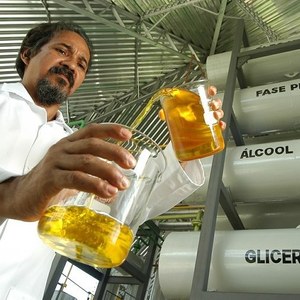Brazil's President Rousseff signs biodiesel increase into law

Photo: MDA
March 29, 2016
BY Ron Kotrba
At the presidential palace March 23, Brazilian President Dilma Rousseff signed into law the mandatory percentage increase of biodiesel blended with diesel fuel from the current 7 percent to 8 percent by 2017, with further increases to 9 percent by 2018 and 10 percent by 2019.
The measure is viewed as a demand guarantee for Brazil, the world’s second largest biodiesel consumer market.
During the ceremony, which was attended by several representatives of the sector, the president stressed that the new law represents important advances for the country in many sectors such as the strengthening of agriculture, family farming, increased fuel supply, energy security, and especially preservation of the environment—the most difficult challenge, according to Rousseff.
Advertisement
Advertisement
“We all win with this—family farming, commercial agriculture, the plants producing biodiesel, consumers in Brazil and the environment,” Rousseff said. “By winning the environment, the entire Brazilian population wins. And I hope that with this combination of flexibility, we also have cheaper prices for fuel.”
The president recalled that Brazil has assumed ambitious commitments in the most recent Climate Conference, the cop21 in Paris, both to reduce emissions and to expand renewable energy in the national energy matrix. Rousseff said this new law will help the country meet these commitments. “This law clearly opens up the possibility that we have a very impressive performance when it comes to the climate issue and the climate change,” she said.
The new law provides for further increasing biodiesel content in diesel fuel to 15 percent beyond 2019 after successful engine testing is completed and the results are approved by the National Energy Policy Council.
Advertisement
Advertisement
“From these tests, the results, the National Energy Policy Council, an advisory body of the Presidency, may raise the percentage added to 15 percent by adopting in Brazil the B15,” Rousseff said.
Erasmo Battistella, president of the Association of Biodiesel Producers of Brazil (Aprobio), celebrated what he called an “historic day” for the biodiesel sector, as the measure signals a guaranteed use of Brazilian-made biodiesel and economic improvements in agriculture.
“From now on, we have predictability,” he said. “And that was what we were looking for. Brazil is the world’s second largest biodiesel consumer market.” He added that Brazil has 7.26 million cubic meters (1.92 billion gallons) of installed biodiesel production capacity with 50 commercial production facilities established.
The Ministry of Mines and Energy estimates that the nation produced slightly more than 1 billion gallons of biodiesel in 2015, up from 898.2 million gallons the year before.
Related Stories
U.S. Secretary of Agriculture Brooke L. Rollins today announced the reorganization of the USDA, refocusing its core operations to better align with its founding mission of supporting American farming, ranching, and forestry.
The U.S. Department of Energy’s Office of Energy Efficiency and Renewable Energy is soliciting public comments on a preliminary plan for determining provisional emissions rates (PER) for the purposes of the 45Z clean fuel production credit.
A new study published by the ABFA finds that the U.S. EPA’s proposal to cut the RIN by 50% for fuels made from foreign feedstocks, as part of its 2026 and 2027 RVOs, could stall the growth of the biomass-based diesel (BBD) industry.
Reps. Mike Flood, R-Neb., and Troy A. Carter, Sr., D-La., on July 21 reintroduced the SAF Information Act. The bill directs the U.S. EIA to more explicitly include SAF data in its weekly and monthly reports.
The U.S Department of Energy Bioenergy Technologies Office, in partnership with the Algae Foundation and NREL, on July 21 announced the grand champion and top four winning teams of the 2023 - 2025 U.S. DOE AlgaePrize Competition.
Upcoming Events










